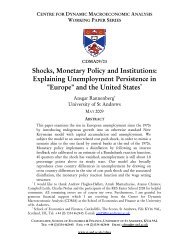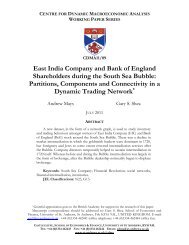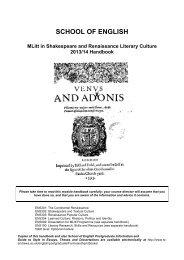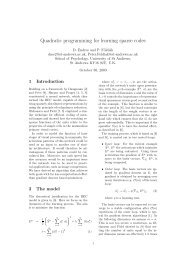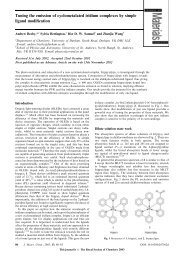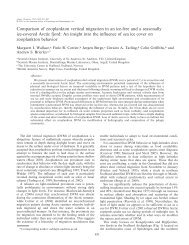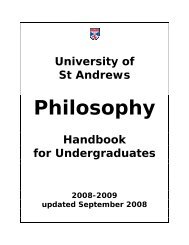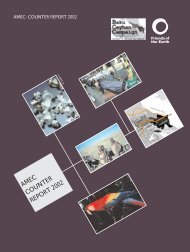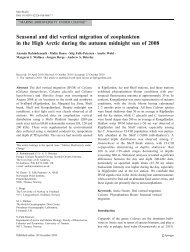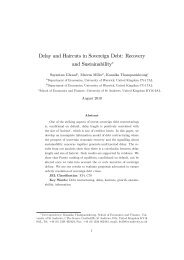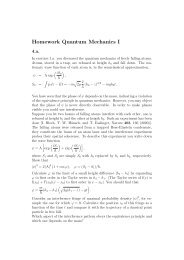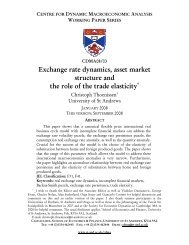introduction what is social anthropology? - University of St Andrews
introduction what is social anthropology? - University of St Andrews
introduction what is social anthropology? - University of St Andrews
You also want an ePaper? Increase the reach of your titles
YUMPU automatically turns print PDFs into web optimized ePapers that Google loves.
In th<strong>is</strong> tutorial, students are expected to draw from their own experiences to d<strong>is</strong>cuss the<br />
relative merits <strong>of</strong> backpacking and the gap year trip. Whose lives are transformed by these<br />
experiences?<br />
• Simpson K. 2005. Dropping Out or Signing Up? The Pr<strong>of</strong>essional<strong>is</strong>ation <strong>of</strong> Youth Travel. In:<br />
Antipode, pp.447‐469.<br />
• Sørensen A., 2003. Backpacker Ethnography. In: Annals <strong>of</strong> Tour<strong>is</strong>m Research, 30(4), pp.847‐<br />
867.<br />
TUTORIAL 9<br />
Why does it make analytical sense to include children in anthropological studies <strong>of</strong> <strong>social</strong><br />
processes? What are the arguments against ‘the <strong>anthropology</strong> <strong>of</strong> childhood’?<br />
• Robertson, A.F. The development <strong>of</strong> meaning: Ontogeny and culture. Journal <strong>of</strong> the Royal<br />
Anthropological Institute (N.S.) 2, 591‐610. 1996.<br />
• Chr<strong>is</strong>tina Toren, Do babies have culture? Anthropological Quarterly, Volume 77, Number<br />
1, Winter 2004, pp. 167‐179. George Washington <strong>University</strong> Institute for Ethnographic<br />
Research.<br />
• Chr<strong>is</strong>tina Toren, ‘An <strong>anthropology</strong> <strong>of</strong> human development: <strong>what</strong> difference does it make?’<br />
In Alan Fogel, Barbara King and <strong>St</strong>uart Shanker, Eds. Human Development in the Twenty‐<br />
First Century. A Dynamic Systems Approach to the Life Sciences, Cambridge <strong>University</strong><br />
Press, 2007.<br />
TUTORIAL 10<br />
What can we learn about the centrality <strong>of</strong> kinship for <strong>anthropology</strong> from ethnographic studies<br />
that focus on children?<br />
• Peter Gow. ‘Helpless. The Affective Preconditions <strong>of</strong> Piro Social Life’, in Joanna Overing and<br />
Alan Passes (eds) The Anthropology <strong>of</strong> Love and Hate: the Aesthetics <strong>of</strong> Conviviality in<br />
Native Amazonia, London, Routledge. 2000.<br />
• Chr<strong>is</strong>tina Toren, ‘Compassion for one another: constituting kinship as intentionality in Fiji’,<br />
1996 Malinowski Lecture, the Journal <strong>of</strong> the Royal Anthropological Institute, (N.S.) 5, 265‐<br />
280 September, 1999.<br />
• Viegas, Susana de Matos. “Eating with Your Favourite Mother: Time and Sociality in a<br />
South Amerindian Community (South <strong>of</strong> Bahia/Brazil).” Journal <strong>of</strong> the Royal<br />
Anthropological Institute 9, no. 1: 21–37, 2003.<br />
32



